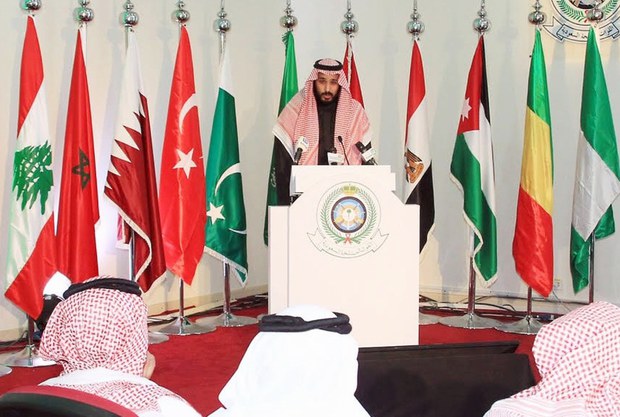Bangladesh, Malaysia Join Saudi-Led Coalition Against Terrorism
2015.12.15
Kamran Reza Chowdhury
 Saudi Defense Minister and Deputy Crown Prince Mohammed bin Salman announces the formation of the 34-member coalition to crush terrorism, Dec. 15, 2015.
Saudi Defense Minister and Deputy Crown Prince Mohammed bin Salman announces the formation of the 34-member coalition to crush terrorism, Dec. 15, 2015.
Bangladesh and Malaysia announced Tuesday that they were joining a new Saudi-led international coalition whose aim is to crush terrorism, but officials from both countries said they would not contribute troops to that effort.
According to Bangladeshi and Malaysian officials, their respective governments agreed to exchange information and intelligence about terrorist threats with Saudi Arabia and other partners in the 34-member coalition. Its operational center will be headquartered in the Saudi capital of Riyadh, reports said.
“In line with the zero-tolerance policy of the government of Prime Minister Sheikh Hasina against terrorism and violent extremism, Bangladesh decided to join the center along with other Muslims countries,” the Bangladeshi foreign ministry said in a statement Tuesday.
“The role of the center will be to coordinate efforts, exchange experiences and provide support where needed. It will provide assistance, such as, material support, information, data, etc., to combat terrorism and extremist ideology.”
State Secretary for Foreign Affairs Shahriar Alam told reporters that Bangladesh would not contribute troops to the coalition.
In Kuala Lumpur, Malaysian Defense Minister Hishammuddin conveyed a similar message.
“The initiative by the Saudi Arabia … does not involve a military commitment but rather a mutual understanding that we are together against militancy. It is the right stand,” Hishammuddin told reporters Tuesday.
But his statement appeared to conflict with one issued by Indonesian officials on the same topic.
Indonesia said Saudi Arabia, a close ally in the Middle East, had invited it to join the coalition, according to a report in Indonesian-language news outlet Merdeka.com.
Jakarta, however, was waiting for more information from Riyadh because “what Saudi Arabia announced today is a military alliance, not a coordination center to counter extremism and terrorism,” Merdeka quoted Indonesian Foreign Affairs Ministry spokesman Arrmantha Nasir as saying.
Coalitions
Indonesia, the world’s largest Muslim country, is predominantly Sunni like Saudi Arabia, Malaysia and Bangladesh, but it is not listed among the 34 countries in the coalition.
The Saudi-led coalition consists of countries with Muslim majorities or sizable Muslim populations.
Predominantly Shiite Iran, Saudi Arabia’s main foe in the Middle East with which it is waging a proxy war in Yemen, is not listed as part of the coalition.
In announcing its establishment this week, Saudi Deputy Crown Prince Mohammed bin Salman did not mention the Islamic State (IS) or al-Qaeda by name, according to a statement from him disseminated by the Saudi Press Agency.
Nevertheless, the coalition will aim to fight such groups, Reuters quoted Saudi Foreign Minister Adel al-Jubeir as saying on Tuesday.
Malaysia is also a new member of a U.S.-led coalition of 65 countries that are cooperating in fighting IS, but Kuala Lumpur is not contributing troops to that collective effort either.
In October, Malaysia announced it was working with the United States to set up a center in Kuala Lumpur whose mission would be to counter IS online propaganda in Southeast Asia.
Malaysia’s government says the country is facing a threat from IS recruiting local youths for its jihadist cause via social media. According to Malaysian officials, as of Dec. 2, 72 Malaysians were believed to have joined IS’s ranks in the Syria or Iraq, and at least 130 people with suspected IS links have been arrested in Malaysia.
Bangladesh: Analyst hail move
Bangladeshi officials, on the other hand, on Tuesday repeated their earlier assertion that IS had no foothold in their country, although the group had claimed responsibility for a series of recent attacks, including the murders of two foreigners and attacks on members of the Shiite minority.
“Sometimes, there are allegations of links of the smaller groups with the large-scale group such as the IS,” State Secretary Alam said during Tuesday’s press briefing at the Ministry of Foreign Affairs.
“So the initiative will help the countries to share intelligence, information, best counter terrorism practices, expertise and others,” he said.
Analysts, meanwhile, praised Bangladesh’s decision to join the Saudi-led coalition.
“Given the government’s zero tolerance for terrorism, Bangladesh must join the coalition against terrorism and extremism,” Imtiaz Ahmed, a professor of international relations at Dhaka University, told BenarNews.
Its participation in the coalition and the opportunity to share intelligence with other countries could help Bangladesh eliminate home-grown extremists, he added.
“This is not a bad decision,” Former Foreign Secretary Shamsher Mobin Chowdhury told BenarNews.
“Maybe Bangladesh has joined the initiative to deter the possibility of the emergence of the IS or their sympathizers here. This is because terrorism is not limited to a particular country now,” he added.
S. Adie Zul contributed to this story.







